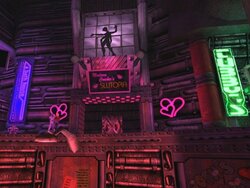RPG Codex Preview: Dr. Dungeon's Madman!
RPG Codex Preview: Dr. Dungeon's Madman!
Preview - posted by Crooked Bee on Mon 16 June 2014, 23:14:09
Tags: Dr. Dungeon; Madman![Preview by Deuce Traveler; edited by Infinitron]
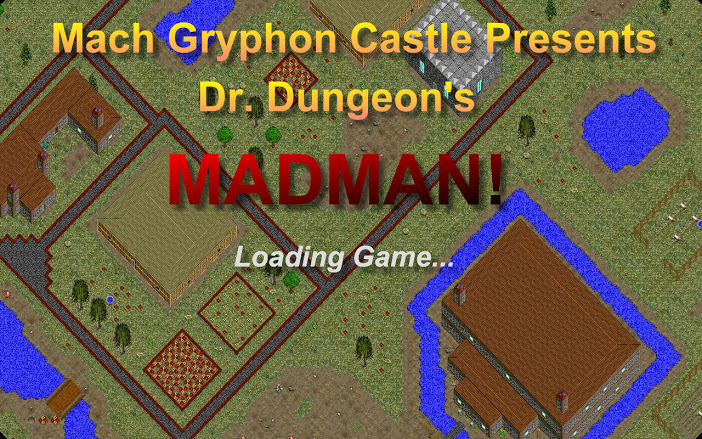
Madman! is an upcoming turn-based, isometric CRPG from the RPG Codex's very own Dr Dungeon. For those of you who are unfamiliar with Dr Dungeon, you should know that he is the programmer who created the obscure Ultizurk RPG series back in the 1990s, which was influenced by both the Ultima and the Zork games. The 2014 Madman! is a remake of a previous Dr Dungeon game by the same name, with its most notable improvement being a graphical upgrade. For this preview, I played a beta version of the game. Dr Dungeon continues to welcome input, so more changes are on the way before the title goes up for sale.
You are a lone hero, declared a Madman and exiled from your home due to the belief that your actions have led to the death of a sibling. Certain in-game events call your sanity into question, like when you dream of having conversations with your supposedly dead sibling. However, it is not just your own character who seems a bit off. In your travels you will encounter NPCs with their own oddball eccentricities - characters who espouse strange philosophies, or throw off their initial shyness to participate in drunken parties, or partake in hobbies such as overly enthusiastic metal polishing. You actually can't play your own character in a straight-laced manner, as the game requires you to occasionally perform criminal acts and be caught in illicit activity. And yet all is not well in your character's adopted land. Monsters roam freely and are often encountered along the borders of civilization. Citizens have gone missing and require a hero to come to their rescue. This, of course, is where you come in, as the locals can't solve these issues themselves.
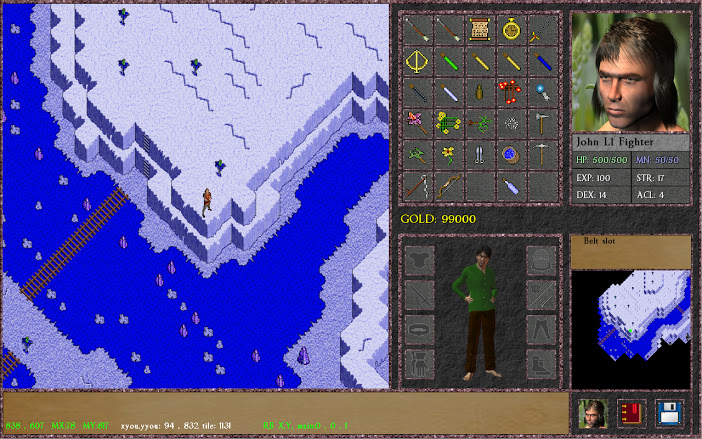
Character creation in Madman! uses a hybrid point system, where character class determines your special abilities and an initial distribution of attributes and skill points. Since you can freely modify the point allocation for attributes and skills, the only permanent effect of class selection is the special abilities. Skills range from the usual combat-oriented ones like melee and ranged combat, to non-combat skills like bartering and lockpicking. Magic is a dual purpose combat/non-combat skill; non-combat magic always works, but attack spells require a skill check before they'll fire properly. Skills have a maximum point value of 200. Madman! is quite combat heavy, so you will want to allocate some points into at least one of the combat skills available - this is not a game that can be won without fighting. However, you will also want to invest in skills that allow you to find hidden passages and open locks, since if you run out of picks you might not be able to complete the game. Crafting is also important, but is depends more on the player's knowledge of what ingredients work together rather than the character's skills. The game supports a wide range of crafting options - weapon and armor smithing, alchemy, and even cooking. There are many tools in the game that can be used to gather food or to create items which you can sell, which is quite helpful at the beginning of the game. Learning how to cure poison also becomes quite the necessity early in your adventure.
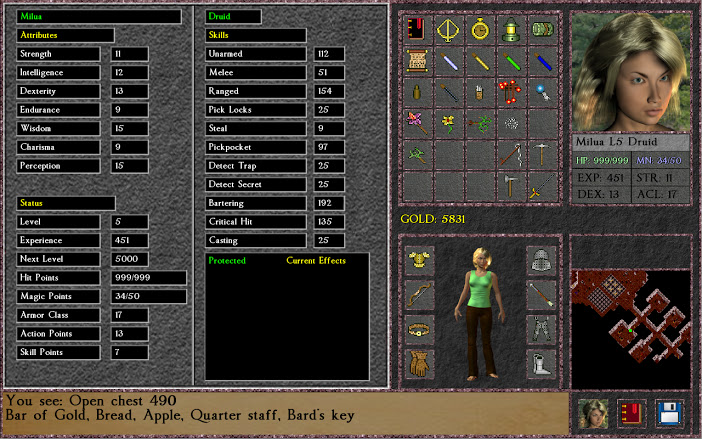
Madman!'s combat system is action point-based. Ranged attacks use up more action points than melee attacks, which helps balance the two somewhat. Still, I found ranged attacks to be superior since combat often starts at a distance, and there are locations where it is not an easy matter to close the distance between yourself and your opponents. Enemy AI is somewhat lacking due to inefficient pathfinding. There were times when the enemy couldn't seem to figure out how to go around a corner to attack me, instead wasting precious action points moving to and fro.
The game also has puzzles, which are better than its combat. You'll really have to pay attention, even with the game's very effective quest log system. Although at times the quest log practically walks you through the steps of your current quest, in general the clues you receive tend to be vague, and you will often find yourself having to go back to the quest giver and pay greater attention to his dialogue in order to piece together what you must do. The game has plenty of fetch quests, but there are also puzzles which pose a larger degree of intellectual challenge. For instance, at one point you're required to insert artifacts into some niches in the ground. You are not given much of a clue as to where these artifacts are, but if you've been paying attention you might realize that some seemingly worthless artifacts you saw before have the exact same shape as the tiled niches. Some quests can be frustrating in their logic, however, such as when you're required to leave the domain of a strange race, who send you to solve a series of puzzles before you can get an important quest item from them. I found this particular set of quests to be quite nonsensical. But then I remembered that the game was called Madman! - nonsense is kind of the point.
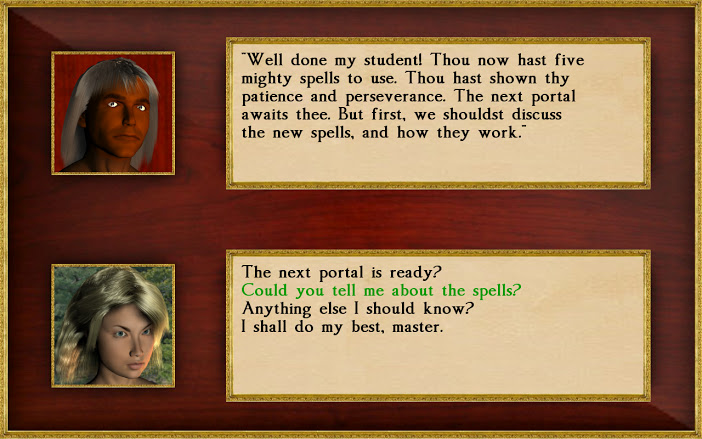
As I've already hinted, there is more going on in Madman! than you might think - there's an underlying cause for the population's mental instability. Dr Dungeon and I had a discussion about the game's influences. He cites Ultima VII as the game's closest comparison. I can definitely see that in the isometric perspective, and in the amount of interaction you can have with items and tools in the game. Still, I think I can recognize a few other influences as well. The fact that the game is about a single character lost on a remote island reminded me more of the first Geneforge game. There is also an aspect of magic meeting science, which is also touched upon in the Geneforge series, and also in the first Might and Magic games. However, the game's actual quests and dialogue are closer to simpler CRPGs from the 1980s, where you would often hack through hordes of monsters to get to a quest item that had little logical reason for having been placed there in the first place.
So, would I recommend the game? It depends. Action-RPG fans are not going to be comfortable playing this game and should probably avoid it due to the interface, graphics, and simple plot. However, I think that those who enjoy firing up the early Ultimas or Might and Magics would be comfortable here. Also, if you've played any of Dr Dungeon's Ultizurk games you will be right at home, as his unique writing style and sense of humor is instantly recognizable. There is even a suggestion in-game that your character in Madman! is the same person as the protagonist of the Ultizurk series, though with a scrambled set of memories.
I hope to see Madman! appear on Desura later this year.

Madman! is an upcoming turn-based, isometric CRPG from the RPG Codex's very own Dr Dungeon. For those of you who are unfamiliar with Dr Dungeon, you should know that he is the programmer who created the obscure Ultizurk RPG series back in the 1990s, which was influenced by both the Ultima and the Zork games. The 2014 Madman! is a remake of a previous Dr Dungeon game by the same name, with its most notable improvement being a graphical upgrade. For this preview, I played a beta version of the game. Dr Dungeon continues to welcome input, so more changes are on the way before the title goes up for sale.
You are a lone hero, declared a Madman and exiled from your home due to the belief that your actions have led to the death of a sibling. Certain in-game events call your sanity into question, like when you dream of having conversations with your supposedly dead sibling. However, it is not just your own character who seems a bit off. In your travels you will encounter NPCs with their own oddball eccentricities - characters who espouse strange philosophies, or throw off their initial shyness to participate in drunken parties, or partake in hobbies such as overly enthusiastic metal polishing. You actually can't play your own character in a straight-laced manner, as the game requires you to occasionally perform criminal acts and be caught in illicit activity. And yet all is not well in your character's adopted land. Monsters roam freely and are often encountered along the borders of civilization. Citizens have gone missing and require a hero to come to their rescue. This, of course, is where you come in, as the locals can't solve these issues themselves.

Character creation in Madman! uses a hybrid point system, where character class determines your special abilities and an initial distribution of attributes and skill points. Since you can freely modify the point allocation for attributes and skills, the only permanent effect of class selection is the special abilities. Skills range from the usual combat-oriented ones like melee and ranged combat, to non-combat skills like bartering and lockpicking. Magic is a dual purpose combat/non-combat skill; non-combat magic always works, but attack spells require a skill check before they'll fire properly. Skills have a maximum point value of 200. Madman! is quite combat heavy, so you will want to allocate some points into at least one of the combat skills available - this is not a game that can be won without fighting. However, you will also want to invest in skills that allow you to find hidden passages and open locks, since if you run out of picks you might not be able to complete the game. Crafting is also important, but is depends more on the player's knowledge of what ingredients work together rather than the character's skills. The game supports a wide range of crafting options - weapon and armor smithing, alchemy, and even cooking. There are many tools in the game that can be used to gather food or to create items which you can sell, which is quite helpful at the beginning of the game. Learning how to cure poison also becomes quite the necessity early in your adventure.

Madman!'s combat system is action point-based. Ranged attacks use up more action points than melee attacks, which helps balance the two somewhat. Still, I found ranged attacks to be superior since combat often starts at a distance, and there are locations where it is not an easy matter to close the distance between yourself and your opponents. Enemy AI is somewhat lacking due to inefficient pathfinding. There were times when the enemy couldn't seem to figure out how to go around a corner to attack me, instead wasting precious action points moving to and fro.
The game also has puzzles, which are better than its combat. You'll really have to pay attention, even with the game's very effective quest log system. Although at times the quest log practically walks you through the steps of your current quest, in general the clues you receive tend to be vague, and you will often find yourself having to go back to the quest giver and pay greater attention to his dialogue in order to piece together what you must do. The game has plenty of fetch quests, but there are also puzzles which pose a larger degree of intellectual challenge. For instance, at one point you're required to insert artifacts into some niches in the ground. You are not given much of a clue as to where these artifacts are, but if you've been paying attention you might realize that some seemingly worthless artifacts you saw before have the exact same shape as the tiled niches. Some quests can be frustrating in their logic, however, such as when you're required to leave the domain of a strange race, who send you to solve a series of puzzles before you can get an important quest item from them. I found this particular set of quests to be quite nonsensical. But then I remembered that the game was called Madman! - nonsense is kind of the point.

As I've already hinted, there is more going on in Madman! than you might think - there's an underlying cause for the population's mental instability. Dr Dungeon and I had a discussion about the game's influences. He cites Ultima VII as the game's closest comparison. I can definitely see that in the isometric perspective, and in the amount of interaction you can have with items and tools in the game. Still, I think I can recognize a few other influences as well. The fact that the game is about a single character lost on a remote island reminded me more of the first Geneforge game. There is also an aspect of magic meeting science, which is also touched upon in the Geneforge series, and also in the first Might and Magic games. However, the game's actual quests and dialogue are closer to simpler CRPGs from the 1980s, where you would often hack through hordes of monsters to get to a quest item that had little logical reason for having been placed there in the first place.
So, would I recommend the game? It depends. Action-RPG fans are not going to be comfortable playing this game and should probably avoid it due to the interface, graphics, and simple plot. However, I think that those who enjoy firing up the early Ultimas or Might and Magics would be comfortable here. Also, if you've played any of Dr Dungeon's Ultizurk games you will be right at home, as his unique writing style and sense of humor is instantly recognizable. There is even a suggestion in-game that your character in Madman! is the same person as the protagonist of the Ultizurk series, though with a scrambled set of memories.
I hope to see Madman! appear on Desura later this year.
There are 23 comments on RPG Codex Preview: Dr. Dungeon's Madman!











